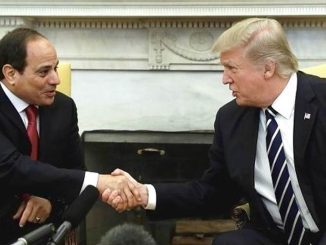
Abdel Fattah Al-Sisi has recently met with Djibouti President Ismail Omar Guelleh in Cairo.
In a press conference, following their bilateral meeting, both al-Sisi and Guelleh stressed the importance of enhancing the economic and trade cooperation between both countries.
During the conference, al-Sisi said that the bilateral meeting witnessed fruitful and constructive discussions regarding bilateral relations between Egypt and Djibouti.
In this context, both countries signed several agreements and memorandums of understanding that included an economic and technical cooperation agreement.
In addition, the two countries have also signed another agreement regarding cooperation in the trade field.
They also signed seven memorandums of understanding in the fields of exports and imports, agriculture, technical education, trade cooperation, international cooperation, health and maritime ports.
Moreover, they stressed the importance of enhancing cooperation in the economic and commercial fields and encouraging activities of Egyptian companies in Djibouti.
Al-Sisi also added that his country will continue to support Djibouti on all developmental levels, particularly regarding health and education.
Al-Sisi mentioned that they both discussed regional issues of mutual interest including the situations in the Horn of Africa and Yemen.
They also talked about the preparations for the African Union Summit that will take place in Ethiopia’s Addis Ababa in January.
Furthermore, Al-Sisi praised Djibouti’s attempts in achieving peace and stability in the African continent.
“I would like to point to the importance of Djibouti’s strategic location on the Horn of Africa and its direct relationship with the security of the Red Sea area,” al-Sisi said.
In the end, al-Sisi concluded in his speech that the ties between Egypt and Djibouti are historical and strong.
This month, Egyptian diplomatic sources revealed that Cairo started almost a month ago, moves to stop the agreement between Saudi Arabia and Djibouti to build a Saudi military base at the entrances of the Gulf of Aden.
Cairo completely rejects this agreement based on the facts that these areas lie in what is considered ‘Egyptian diplomatic influence’, and fall within Egypt’s national security zone as an Egyptian strategic depth in the far south, according to sources.
It is noteworthy that Egyptian-Saudi tension has risen recently as a result of Egypt’s divergent stances in sensitive issues to Riyadh.
Egypt has voted in favor of a Russian-backed draft resolution in the UN Security Council on Syria, which was opposed by Saudi Arabia, which angered Egypt’s major Gulf backer so much that it described Egypt’s vote as a “painful” stance.
After the voting, the Saudi ambassador to the UN, Abduallah al-Mouallimi said, “It was painful that the Senegalese and Malaysian stance was closer to the Arab’s consensus than the Egyptian delegation.” He also said that he feels pity for these countries that voted for the Russian resolution, stressing that his country will continue backing the Syrian people by all means.
Two days following the voting, Saudi state-owned oil company Aramco announced halting oil product supply to Egypt.
Djibouti’s maritime border is located on the Bab Al-Mandab Strait, through which vessels navigating Egypt’s Suez Canal pass.
Countries around the world race to establish military bases in Djibouti, because of its strategic geographical location as it lies on the western coast of Bab el-Mandeb Strait, linking the Red Sea and the Arabian Sea.
In this context, both the Kingdom of Saudi Arabia and China sought to enter the race in Djibouti which hosts bases for the United States of America, France, Italy, and Japan.
Renting military bases is considered one of the most important sources of revenues for Djibouti as it gains almost $ 160 million a year.
It seems that the cold war between Egypt and Saudi Arabia has turned toward Africa as a proxy zone in response after Egypt’s divergent stance to the kingdom’s policies.
In addition to Saudi Arabia’s interest in building a military base in Djibouti, the kingdom also started to take moves toward Ethiopia.
The Kingdom sent Ahmed Al-Khatib, the adviser of Saudi King Salman bin Abdulaziz, in a visit to the Ethiopian Renaissance Dam within the framework of his current presence in the Ethiopian capital, Addis Ababa, to find out the possibility of renewable energy generation.
There is no doubt that the Saudi moves have raised doubts and fear among the Egyptian officials especially the recent visit to Ethiopia. Egypt is sensitive towards the Renaissance Dam issue as it fears it would affect its water shares from the Nile River.
In response, Egypt has received multiple African leaders, including those of Kenya and Eritrea over the past month, who expressed readiness to boost bilateral cooperation with Egypt.
Moreover, on December 20, Al-Sisi visited Uganda, that didn’t exceed one day, where he discussed with his Ugandan counterpart Yoweri Museveni boosting the water projects between both countries, particularly the maritime project that links between Lake Victoria and the Mediterranean Sea.



